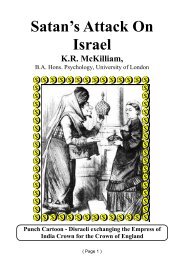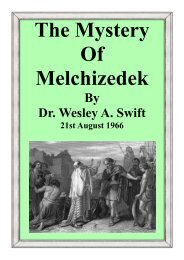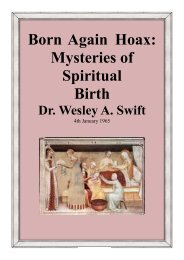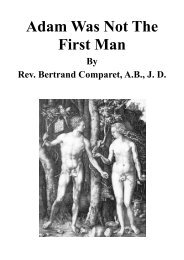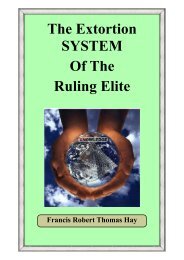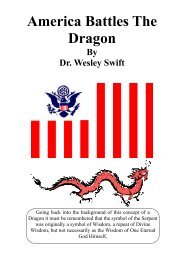Curse of Cannan - The New Ensign
Curse of Cannan - The New Ensign
Curse of Cannan - The New Ensign
You also want an ePaper? Increase the reach of your titles
YUMPU automatically turns print PDFs into web optimized ePapers that Google loves.
<strong>The</strong> military occupation <strong>of</strong> the South was further reinforced when President Grant passed the<br />
aptly named Force Act <strong>of</strong> 1870. This act suspended habeas corpus and placed total power in the<br />
hands <strong>of</strong> the military occupiers <strong>of</strong> the Southern states. His Enforcement Acts <strong>of</strong> 1871 put<br />
Congressional elections in the South under the control <strong>of</strong> federal authorities, a method which<br />
was revived in the 1 960s and 1 970s, when federal authorities again invaded the Southern states<br />
to place elections under their supervision. <strong>The</strong>se were the auspices under which the Constitution<br />
<strong>of</strong> the United States was rewritten and nullfied. In 1877, twelve years after the end <strong>of</strong> the Civil<br />
War, twelve years after the Thirteenth Amendment was ratified, nine years after the Fourteenth<br />
Amendment was ratified, and seven years after the Fifteenth Amendment was ratified, President<br />
Hayes withdrew the federal troops from the Southern states.<br />
<strong>The</strong> scalawag looting <strong>of</strong> the impoverished South was typified by the career <strong>of</strong> Franklin Israel<br />
Moses Jr. in South Carolina. His father had been appointed Chief Justice <strong>of</strong> the Supreme Court<br />
<strong>of</strong> South Carolina during the period <strong>of</strong> Reconstruction, serving in that <strong>of</strong>fice from 1868-1877.<br />
Significantly, he ended his term when the federal troops were withdrawn. In 1866, Moses Jr.<br />
began to publish a newspaper, Sumter <strong>New</strong>s, which enthusiastically endorsed all four <strong>of</strong> the<br />
Reconstruction Acts. He was elected as Speaker <strong>of</strong> the House by the "Loyal League," a scalawag<br />
group. For more than a decade, he spent millions <strong>of</strong> dollars in lavish living, money which he<br />
accumulated by accepting bribes in <strong>of</strong>fice, and by filing bogus state pay vouchers for hundreds<br />
<strong>of</strong> nonexistent state employees. He also dealt heavily in fraudulent state contracts. He purchased<br />
a $40,000 mansion (the equivalent <strong>of</strong> $10 million in today's money), and was renowned as the<br />
biggest spender in South Carolina. With the withdrawal <strong>of</strong> federal troops, which zealously<br />
protected the "rights" <strong>of</strong> such scoundrels, he came under scrutiny for his criminal acts. In 1878,<br />
to avoid prosecution, he fled to Massachusetts, where he finally died in 1906. Throughout the<br />
remainder <strong>of</strong> his life, he was known as a dope addict and confidence trickster. <strong>The</strong> Moses saga<br />
is redolent <strong>of</strong> the aroma which attended every act <strong>of</strong> the scalawags and carpetbaggers in the<br />
South.<br />
In "<strong>The</strong> Tragic Era" by Claude Bowers, one <strong>of</strong> the many books which have documented the<br />
excesses <strong>of</strong> the Reconstruction period, Bowers writes on p. 29, " ... in Louisiana, Sheridan rattling<br />
the sword, was spluttering epithets in an attempt to save the Radicals he served from the<br />
destruction they merited .... " Bowers describes the Reconstruction as "Cromwellian," an apt<br />
description. <strong>The</strong> revolution in the South which it served to introduce was in essence a<br />
Cromwellian interpretation <strong>of</strong> the Masonic Canaanite Order. <strong>The</strong> mockery <strong>of</strong> election laws and<br />
indeed <strong>of</strong> the legal system under Reconstruction was remarkably exposed by Bowers when he<br />
wrote <strong>of</strong> the Durell episode. A conservative group had elected John McEnery as Governor, but<br />
an illegal returning board had ignored his election and given the Governorship to his opponent,<br />
W. P. Kellogg, without even counting the votes, although a legal returning board had already<br />
certified the election <strong>of</strong> McEnery. Bowers writes, "<strong>The</strong> drunken Federal Judge Durell, with the<br />
trembling fingers <strong>of</strong> inebriety, had written his midnight injunction against the legal returning<br />
board, and instructed U.S. Marshal Packard, the Republican manager, to take possession <strong>of</strong> the<br />
State House .... <strong>The</strong> next morning, the besotted judge declared the lawful board illegal and<br />
restrained it from counting the election returns." Bowers noted that "the audacity <strong>of</strong> the crime<br />
rocked the Nation." Terming Durell a "drunken tyrant," Bowers chronicles the widespread protest<br />
against his vicious act. Today, the name <strong>of</strong> Durell is still despised in the State <strong>of</strong> Louisiana as a<br />
synonym for federal judicial tyranny. Durell was typical <strong>of</strong> the besotted Oriental despots, acting<br />
with the backing <strong>of</strong> federal troops, as they still do today, who use the Constitution <strong>of</strong> the United<br />
States as toilet tissue while they crush the people <strong>of</strong> Shem under the heels <strong>of</strong> their judicial Masonic<br />
Order <strong>of</strong> Canaanite tyranny. It is the Durells who have made the federal courts the most hated<br />
institutions in American life today, in 1987, just as Durell caused them to be despised in 1872.<br />
Because <strong>of</strong> the depredations <strong>of</strong> such scalawags as Durell and Moses, the defeated Southerners<br />
had lost more than $500 million in cash during the Civil War, the result <strong>of</strong> their patriotic purchases<br />
<strong>of</strong> Confederate bonds, which were repudiated one hundred per cent by the scalawag legislatures.<br />
Only their land holdings were left. Almost half <strong>of</strong> their assets were computed in their holdings<br />
<strong>of</strong> slaves, and these were now gone. Much <strong>of</strong> their land was now confiscated, due to heavy<br />
( Page 84)




